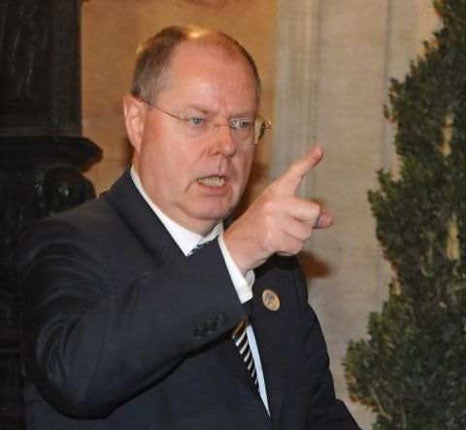Europe's Black Friday seized on to defend British policies
As G7 finance ministers gather, damning report shows scale of Germany's economic woes

Ministers have declared victory in their bitter war of words with Berlin over the handling of the global economic downturn after figures showed the German economy recorded one of the biggest slumps in Europe in the final months of last year.
They claimed vindication after European growth figures showed the German economy contracted by 2.1 per cent between October and December. British output fell by 1.5 per cent, in line with the average for eurozone nations.
Relations between Britain and Germany descended into a bitter diplomatic row in December when the German Finance Minister, Peer Steinbrück, accused Gordon Brown of "crass Keynesianism", warning that measures such as the Treasury's 2.5 per cent VAT cut would "take a whole generation to work off".
Yesterday, finance ministers gathered in Rome for the start of a G7 meeting to discuss the best way to tackle the global economic crisis, the first of its kind since October last year. Last night they attended an opening dinner before the real work begins today. It is hoped that new US Treasury Secretary Timothy Geithner will use the opportunity to give details of measures planned by the Obama administration to ease the downturn.
British ministers said the European industrial production figures suggested that the UK could emerge from the downturn stronger than its rivals. One said yesterday: "This is Europe's Black Friday. We don't minimise the problems people are facing in the recession, but it does put our problems in context."
Yesterday's figures showed that Lithuania, Germany, Slovakia, Portugal and Italy all suffered a worse fall in output than Britain during the final months of 2008. But other European countries such as France, Belgium, Spain, Hungary and Austria all fared considerably better.
A government source said: "Although Britain has one of the largest financial sectors, the one hit hardest and fastest by the global banking collapse, these statistics show that Britain continues to hold its own, with other countries like Germany facing a longer and deeper recession than Britain."
Denis MacShane, the former Europe minister, said: "In the past some British ministers and commentators used to make critical remarks about the Germans' policy on the economy and equally some French and Germans have been critical of Britain. Europe's political leaders have to realise that all of Europe is in an economic crisis and we need common policies to get out of it."
Lord Turnbull, the former head of the Civil Service, likened the period before the financial crisis to the failures of intelligence in the run-up to the Iraq war. He told Channel Four News: "Now what this is, is a collective failure: that people basically believed – and all sorts of people, the regulators, the bankers, the economic policy-makers – they believed in a particular view of the world and the things that should have acted as restraints in all of this – regulators, rating agencies, accounting, corporate governance – none of that worked because of the power of consensus.
"It was a bit like Y2K [the supposed millennium bug]. Why did we all believe Y2K? We all went along with each other ... weapons of mass destruction. A very strong collective belief comes about."
There was also anger at reports that staff at the Financial Services Authority could be in line for bonuses and pay increases of up to £33m this year. Vince Cable, the Liberal Democrat Treasury spokesman, said: "This is utterly ridiculous. The bonus culture is completely out of control. If anyone needs to be setting an example in relation to bonus payments, it's government departments and the FSA."
Mr Brown pledged to root out "irresponsible risk-taking, and irresponsible and excessive behaviour" in Britain's banks. He used a speech at Coventry University to declare: "They are stewards of people's money and they should not be speculators in people's money. What we have got to do now is to make sure that in the lending the banks do, that they are absolutely responsible. We will do everything we can to repair the banking system and make sure that people can have the confidence that is necessary for our economy to flourish."
George Osborne, the shadow Chancellor, blamed the Prime Minister. He said: "HBOS bankers like James Crosby bear a heavy responsibility, but so too does his ally Gordon Brown."
G7 menu As imagined by Sean O'Grady
Starters
Italian Berlusconi ham
with banker's capers and a subprime salad
Seasoned hash-Brown
Amuse-bouche
Ms Merkel's special pickle
Mains
Humble pie, green shoots and leaks
Debt à la toxique
Roast Darling served with a Moreno and Crosby morass
Yes We Canned essence of hope
To follow
Banker's Ramp
Chickening Out
Baked Obama
On the trolley
Raspberry fools
Mervyn's Surprise
Fred the Shredded Wheat
Sour grapes
Hard cheese
Smorgasbord of fiscal and
monetary policy options
Wines
Chateau Sarkozy 2007 (rather cheeky)
Bernie Madoff's New World in the Red (barely palatable)
Vat not charged; discretionary bonuses at 12.5%
Subscribe to Independent Premium to bookmark this article
Want to bookmark your favourite articles and stories to read or reference later? Start your Independent Premium subscription today.

Join our commenting forum
Join thought-provoking conversations, follow other Independent readers and see their replies